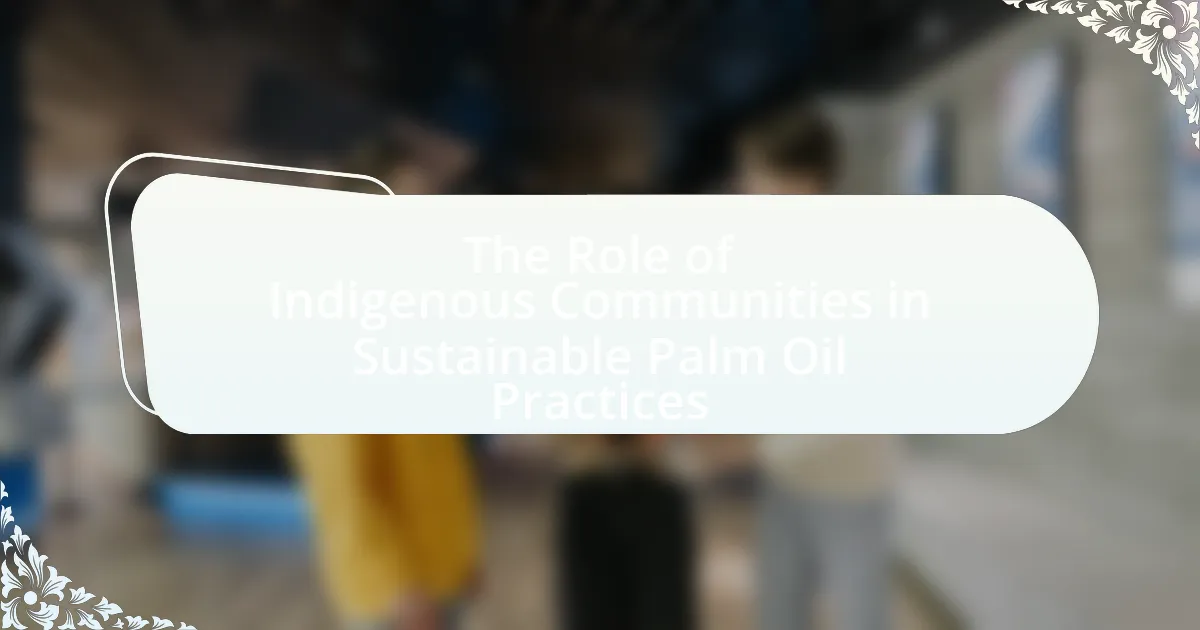Indigenous communities play a vital role in sustainable palm oil practices by combining traditional ecological knowledge with modern agricultural techniques. Their management of palm oil cultivation promotes biodiversity, reduces deforestation, and advocates for land rights, ensuring environmental sustainability and social equity. The article explores how Indigenous practices enhance biodiversity, the challenges these communities face, and the importance of their involvement in decision-making processes. It also discusses the potential for collaboration between Indigenous peoples and palm oil producers to foster sustainable practices and improve livelihoods through fair trade initiatives and policy changes.

What is the role of Indigenous communities in sustainable palm oil practices?
Indigenous communities play a crucial role in sustainable palm oil practices by integrating traditional ecological knowledge with modern agricultural techniques. Their deep understanding of local ecosystems allows them to manage palm oil cultivation in ways that minimize environmental impact, such as maintaining biodiversity and preventing deforestation. For instance, studies have shown that Indigenous-managed lands often exhibit higher levels of biodiversity compared to conventionally farmed areas, highlighting their effectiveness in sustainable land use. Additionally, Indigenous communities advocate for land rights and sustainable practices, influencing policies that promote responsible palm oil production. Their involvement ensures that palm oil cultivation respects both environmental sustainability and social equity, making them key stakeholders in the industry.
How do Indigenous communities contribute to sustainable palm oil production?
Indigenous communities contribute to sustainable palm oil production by implementing traditional ecological knowledge and practices that promote biodiversity and environmental stewardship. These communities often manage their lands using agroforestry techniques, which integrate palm oil cultivation with other crops, thereby enhancing soil health and reducing the need for chemical fertilizers. Research indicates that areas managed by Indigenous peoples tend to have higher levels of biodiversity compared to monoculture plantations, as they prioritize ecosystem balance and sustainable resource use. Furthermore, Indigenous land management practices have been shown to reduce deforestation rates, as these communities typically have a vested interest in preserving their ancestral lands for future generations.
What traditional knowledge do Indigenous communities bring to palm oil cultivation?
Indigenous communities contribute extensive traditional knowledge to palm oil cultivation, particularly in sustainable agricultural practices. This knowledge encompasses techniques for soil management, pest control, and crop rotation that have been refined over generations, ensuring ecological balance and biodiversity. For instance, Indigenous practices often include the use of native plants to enhance soil fertility and natural pest deterrents, which reduces reliance on chemical fertilizers and pesticides. Research indicates that these methods can lead to higher yields while preserving the environment, as seen in studies highlighting the effectiveness of traditional agroecological practices in regions like Southeast Asia.
How do Indigenous practices enhance biodiversity in palm oil farming?
Indigenous practices enhance biodiversity in palm oil farming by integrating traditional ecological knowledge and sustainable land management techniques. These practices often include polyculture systems, which promote a variety of plant species alongside palm oil, thereby supporting diverse habitats and wildlife. Research indicates that areas managed by Indigenous communities typically exhibit higher species richness and abundance compared to monoculture plantations. For instance, a study published in the journal “Biodiversity and Conservation” found that Indigenous-managed lands in Southeast Asia maintained 30% more biodiversity than conventional palm oil farms, demonstrating the effectiveness of these practices in fostering ecological balance.
Why is the involvement of Indigenous communities crucial for sustainability?
The involvement of Indigenous communities is crucial for sustainability because they possess traditional ecological knowledge that enhances environmental stewardship. This knowledge, accumulated over generations, includes sustainable land management practices that promote biodiversity and ecosystem health. For instance, studies have shown that Indigenous-managed lands often have higher biodiversity levels compared to non-Indigenous lands, as seen in the Amazon rainforest, where Indigenous territories have lower deforestation rates. Furthermore, Indigenous communities often prioritize the long-term health of their environment over short-term economic gains, aligning with sustainable practices that benefit both the ecosystem and local communities.
What are the environmental impacts of excluding Indigenous communities from palm oil practices?
Excluding Indigenous communities from palm oil practices leads to significant environmental degradation, including deforestation, loss of biodiversity, and increased greenhouse gas emissions. Indigenous communities often possess traditional ecological knowledge that promotes sustainable land management and conservation practices. For instance, studies show that areas managed by Indigenous peoples have lower deforestation rates compared to those without their involvement, as they prioritize the preservation of ecosystems. Furthermore, the absence of these communities can result in monoculture plantations that disrupt local ecosystems, leading to habitat loss for various species and contributing to climate change through carbon release from deforested areas.
How does Indigenous participation influence social equity in palm oil production?
Indigenous participation significantly enhances social equity in palm oil production by ensuring that local communities have a voice in decision-making processes and benefit from the economic activities in their territories. This involvement leads to fairer distribution of resources and profits, as Indigenous communities often advocate for sustainable practices that protect their land and rights. For instance, studies have shown that when Indigenous groups are included in palm oil governance, there is a marked reduction in land conflicts and an increase in community-led initiatives that prioritize environmental sustainability and social justice. This is evidenced by the success of initiatives like the Roundtable on Sustainable Palm Oil (RSPO), which incorporates Indigenous rights into its standards, promoting equitable practices in the industry.

What challenges do Indigenous communities face in sustainable palm oil practices?
Indigenous communities face significant challenges in sustainable palm oil practices, primarily due to land rights issues, lack of access to resources, and insufficient recognition of traditional knowledge. Land rights issues arise when Indigenous territories are encroached upon by palm oil plantations, often without consent, leading to conflicts and loss of ancestral lands. Additionally, these communities frequently lack access to financial resources and technical support necessary for implementing sustainable practices, which hampers their ability to compete with larger corporations. Furthermore, the traditional ecological knowledge of Indigenous peoples is often overlooked in favor of industrial agricultural methods, despite its potential to enhance sustainability in palm oil production. These challenges are compounded by regulatory frameworks that do not adequately protect Indigenous rights or promote their involvement in sustainable palm oil initiatives.
How do land rights issues affect Indigenous communities in palm oil regions?
Land rights issues significantly undermine Indigenous communities in palm oil regions by depriving them of their ancestral territories and resources. This loss of land leads to diminished cultural identity, as traditional practices and livelihoods tied to the land are disrupted. For instance, a study by the Forest Peoples Programme highlights that Indigenous peoples often face legal challenges when asserting their land rights, resulting in increased poverty and social conflict. Furthermore, the encroachment of palm oil plantations can lead to environmental degradation, which further impacts the health and sustainability of Indigenous communities.
What legal frameworks exist to protect Indigenous land rights?
Legal frameworks that protect Indigenous land rights include international treaties, national laws, and regional agreements. The United Nations Declaration on the Rights of Indigenous Peoples (UNDRIP) establishes global standards for the recognition of Indigenous land rights, emphasizing the importance of free, prior, and informed consent before any development occurs on their lands. Additionally, national laws in countries like Canada and Australia recognize Indigenous land claims through specific legislation, such as the Indian Act in Canada and the Native Title Act in Australia, which provide mechanisms for land restitution and recognition of traditional land use. These frameworks are supported by various court rulings that affirm Indigenous rights, such as the landmark case of Mabo v Queensland in Australia, which recognized the existence of native title.
How do conflicts with palm oil companies impact Indigenous livelihoods?
Conflicts with palm oil companies significantly undermine Indigenous livelihoods by leading to land dispossession and resource depletion. Indigenous communities often rely on their ancestral lands for agriculture, hunting, and gathering, which are essential for their cultural identity and economic sustenance. When palm oil companies encroach upon these lands, they disrupt traditional practices and diminish access to vital resources. For instance, a study by the Forest Peoples Programme highlights that over 60% of Indigenous peoples in palm oil-producing regions report loss of land and livelihoods due to corporate expansion. This loss not only threatens food security but also erodes cultural heritage, as traditional knowledge and practices tied to the land are increasingly marginalized.
What barriers exist to the integration of Indigenous knowledge in palm oil practices?
Barriers to the integration of Indigenous knowledge in palm oil practices include legal restrictions, lack of recognition of land rights, and cultural misunderstandings. Legal frameworks often prioritize corporate interests over Indigenous rights, limiting their ability to influence palm oil practices. Additionally, many Indigenous communities face challenges in asserting their land rights, which undermines their traditional ecological knowledge. Cultural misunderstandings between Indigenous peoples and palm oil companies can further hinder collaboration, as companies may not fully appreciate or respect Indigenous practices and perspectives. These barriers collectively impede the effective incorporation of Indigenous knowledge into sustainable palm oil practices.
How can education and awareness improve the situation for Indigenous communities?
Education and awareness can significantly improve the situation for Indigenous communities by empowering them with knowledge about their rights, sustainable practices, and environmental stewardship. This empowerment enables Indigenous peoples to advocate for their land rights and engage in sustainable palm oil practices that align with their cultural values. For instance, education initiatives that focus on traditional ecological knowledge can enhance biodiversity conservation efforts, as seen in studies where Indigenous land management practices have led to healthier ecosystems. Furthermore, raising awareness among non-Indigenous populations about the importance of respecting Indigenous rights can foster partnerships that support sustainable development, as evidenced by successful collaborations in various regions that prioritize Indigenous voices in environmental decision-making.
What role do NGOs play in supporting Indigenous communities in palm oil practices?
NGOs play a crucial role in supporting Indigenous communities in palm oil practices by advocating for their rights, promoting sustainable agricultural methods, and facilitating access to resources. These organizations often work to ensure that Indigenous voices are included in decision-making processes related to land use and palm oil production, thereby protecting their traditional knowledge and cultural heritage. For instance, NGOs like the Rainforest Foundation and the Forest Peoples Programme have been instrumental in securing land rights for Indigenous peoples, which is essential for sustainable palm oil cultivation. Additionally, they provide training and resources to help these communities adopt environmentally friendly practices, contributing to both economic stability and ecological preservation.

How can Indigenous communities and palm oil producers collaborate for sustainability?
Indigenous communities and palm oil producers can collaborate for sustainability by integrating traditional ecological knowledge with sustainable agricultural practices. This collaboration can lead to the development of agroforestry systems that enhance biodiversity, improve soil health, and reduce deforestation. For instance, studies have shown that incorporating indigenous land management techniques can increase crop yields while preserving natural ecosystems. Furthermore, partnerships can be formalized through fair trade agreements that ensure equitable profit-sharing, thereby supporting the livelihoods of Indigenous peoples while promoting sustainable palm oil production. This approach not only addresses environmental concerns but also respects and empowers Indigenous rights and cultural heritage.
What best practices can be adopted for effective collaboration?
Effective collaboration can be achieved by establishing clear communication channels, setting shared goals, and fostering mutual respect among all participants. Clear communication ensures that all stakeholders understand their roles and responsibilities, which is crucial in complex projects like sustainable palm oil practices involving indigenous communities. Setting shared goals aligns the efforts of diverse groups, enhancing cooperation and commitment to sustainability objectives. Fostering mutual respect acknowledges the unique knowledge and contributions of indigenous communities, which is essential for successful collaboration in environmental initiatives. These practices are supported by research indicating that collaborative efforts that prioritize communication and respect lead to more effective outcomes in community-based resource management.
How can mutual respect and understanding be fostered between Indigenous communities and palm oil producers?
Mutual respect and understanding can be fostered between Indigenous communities and palm oil producers through collaborative engagement and transparent communication. Establishing partnerships that involve Indigenous leaders in decision-making processes ensures that their rights, traditions, and knowledge are respected. For instance, the Roundtable on Sustainable Palm Oil (RSPO) emphasizes the importance of Free, Prior, and Informed Consent (FPIC), which mandates that producers seek consent from Indigenous communities before initiating projects on their lands. This approach not only acknowledges the sovereignty of Indigenous peoples but also enhances the sustainability of palm oil practices by integrating traditional ecological knowledge. Studies have shown that when Indigenous communities are actively involved, there is a significant reduction in conflicts and an increase in sustainable land management practices, benefiting both parties.
What successful case studies exist of collaboration in sustainable palm oil practices?
Successful case studies of collaboration in sustainable palm oil practices include the Roundtable on Sustainable Palm Oil (RSPO) and the collaboration between the Indonesian government and indigenous communities in the Kalimantan region. The RSPO has established standards for sustainable palm oil production, promoting practices that protect the environment and support local communities. In Kalimantan, partnerships between indigenous groups and palm oil companies have led to the implementation of agroforestry systems that enhance biodiversity and provide economic benefits to local populations. These initiatives demonstrate effective collaboration that balances economic development with environmental sustainability.
What practical steps can be taken to enhance Indigenous involvement in sustainable palm oil?
To enhance Indigenous involvement in sustainable palm oil, companies should establish partnerships with Indigenous communities that prioritize their rights and knowledge. This can be achieved by implementing co-management agreements that allow Indigenous peoples to participate in decision-making processes regarding land use and resource management. Additionally, providing training programs focused on sustainable agricultural practices can empower Indigenous farmers to adopt eco-friendly techniques, thereby increasing their participation in the palm oil supply chain. Research indicates that when Indigenous communities are actively involved, there is a significant reduction in deforestation rates and improved biodiversity outcomes, as seen in studies conducted by the World Resources Institute.
How can policy changes support Indigenous communities in palm oil production?
Policy changes can support Indigenous communities in palm oil production by ensuring land rights, promoting equitable profit-sharing, and enforcing sustainable practices. Recognizing and legally protecting the land rights of Indigenous communities allows them to maintain control over their ancestral territories, which is crucial for sustainable palm oil cultivation. For instance, the United Nations Declaration on the Rights of Indigenous Peoples emphasizes the importance of land rights, which can lead to better environmental stewardship and economic benefits for these communities. Additionally, policies that mandate fair profit-sharing from palm oil revenues can empower Indigenous groups economically, enabling them to invest in sustainable agricultural practices. Research indicates that when Indigenous communities are involved in decision-making processes, there is a significant increase in biodiversity and ecosystem health, demonstrating the effectiveness of inclusive policies in promoting sustainability in palm oil production.
What initiatives can promote fair trade practices in palm oil that benefit Indigenous communities?
Initiatives that can promote fair trade practices in palm oil benefiting Indigenous communities include establishing certification programs that recognize and reward sustainable practices, implementing community land rights policies, and fostering direct trade relationships between producers and consumers. Certification programs, such as those by the Roundtable on Sustainable Palm Oil (RSPO), ensure that palm oil is produced in an environmentally and socially responsible manner, which can directly benefit Indigenous communities by providing them with fair compensation and recognition for their sustainable practices. Community land rights policies empower Indigenous groups to maintain control over their ancestral lands, which is crucial for protecting their livelihoods and cultural heritage. Additionally, direct trade relationships can eliminate intermediaries, allowing Indigenous producers to receive a larger share of the profits, thereby enhancing their economic stability and promoting sustainable palm oil production.

Leave a Reply